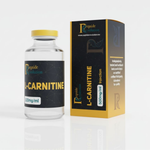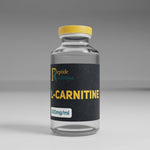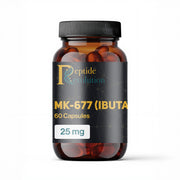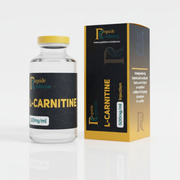
Find out what benefits peptides have
-
Description
-
Shipping
-
Review
What is L-carnitine
L-carnitine (systematically: β-hydroxy-γ-N-trimethylaminobutyrate) is a biologically active substance naturally synthesized in the body from the amino acids lysine and methionine. It is found most abundantly in skeletal muscles, heart muscle and liver. Biochemically, it belongs to the quaternary amines and plays an irreplaceable role in the transport of long-chain fatty acids into mitochondria, where they are broken down through β-oxidation.
The substance is dependent on several cofactors such as vitamin C, B6, niacin and iron, which condition its endogenous synthesis.
As a result, it allows cells to obtain energy from fats. It is precisely because of this function that it has become the subject of intensive research in the field of metabolism, performance and regeneration.
Researched effects and interesting facts
- Energy supply (β-oxidation): L-carnitine allows fatty acids to enter the mitochondria, where they are converted into energy.
- Increase in physical performance: In some studies, improved endurance, delayed fatigue, and more efficient use of fats instead of glycogen.
- Regeneration: Reducing oxidative stress and muscle fiber damage can accelerate recovery from exercise.
- Testosterone and androgen receptors: Research suggests that L-carnitine may increase the expression of androgen receptors in muscle tissue, which may increase the body's response to anabolic stimuli.
- Neuroprotective effects: Experiments are investigating its effect on mitochondrial function in brain cells, which is related to memory, mood, and resistance to neurodegeneration.

How does injectable L-carnitine work
Injectable L-carnitine enters the bloodstream directly, bypassing the digestive tract. This achieves significantly higher bioavailability - 98–100% is commonly reported, while the oral form is only 10–15%. This difference has a significant impact in studies requiring a rapid onset of action or stable plasma levels.
In addition, the injectable form avoids the formation of undesirable metabolites such as TMA and TMAO, which are formed in the intestines after oral administration and are associated with increased cardiovascular risk.
From a mechanistic point of view, the function remains identical - injected L-carnitine ensures the transfer of fatty acids across the mitochondrial membrane, where they are converted into ATP as the main source of cellular energy.
Dosage in studies
- Dose: 500–2000 mg daily
- Form: intramuscular or subcutaneous
- Frequency: 1–2x daily depending on the study objective
- Duration: 4–6 weeks or longer research protocols
L-carnitine is an amino acid derivative naturally found in the human body, known for its role in the transport of fatty acids into mitochondria, where they are processed for energy.
| Parameter | Value |
|---|---|
| Form | Solution |
| Content | 500 mg of L-carnitine in 1 ml |
| Concentration (test) | 479.25 mg/ml ±1 mg |
| Packaging | 10 ml glass vial with sterile cap |
| Storage | 2–8 °C, away from light |
| Molecular Formula | C7H15NO3 |
| Molecular weight | 161.1989 g·mol⁻¹ |
| IUPAC name | (3R)-3-hydroxy-4-(trimethylazaniumyl)butanoate |
| CAS number | 541-15-1 |
| Other names | levocarnitine, (R)-carnitine, L-Carnitine Base |
In laboratory studies, L-carnitine has been linked to research in areas such as:
- supporting fat burning and regulating body weight,
- increasing physical performance and endurance,
- accelerating recovery after physical exertion,
- improving metabolic efficiency and energy availability,
- supporting the cardiovascular and nervous systems.
Possible side effects (injectable form)
- Irritation, redness, or itching at the injection site
- Burning sensation upon injection (depending on the rate of administration and concentration)
- Rarely nausea or increased heart rate frequency
Resources
- Liu, J. et al. (2004). L-Carnitine Supplementation in Recovery from Exercise-Induced Muscle Damage
- Brass, E.P. (2000). Carnitine metabolism and its regulation in microorganisms and mammals
- Hoppel, C.L. (2003). The role of carnitine in normal and altered fatty acid metabolism
- Kraemer, W.J. et al. (2006). Androgen receptor regulation by L-carnitine in resistance training
- Evans, A.M. et al. (2009). Effects of L-carnitine supplementation on physical performance
Slovakia - delivery usually within 3 to 7 business days.
Czech Republic - delivery usually within 3 to 7 business days.
Hungary - delivery usually within 3 to 7 business days.
International delivery takes 4 to 30 days depending on the country.
As soon as we ship your package, we'll automatically send you an email with a tracking link.
- 14-day money-back guarantee
- Fast worldwide delivery
- Third-party tested







